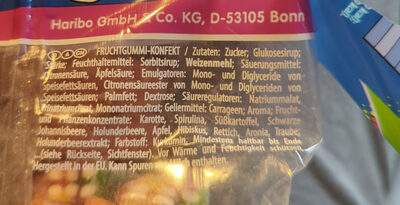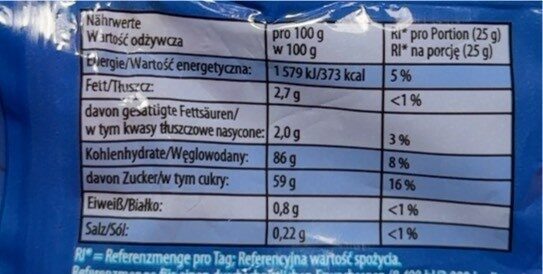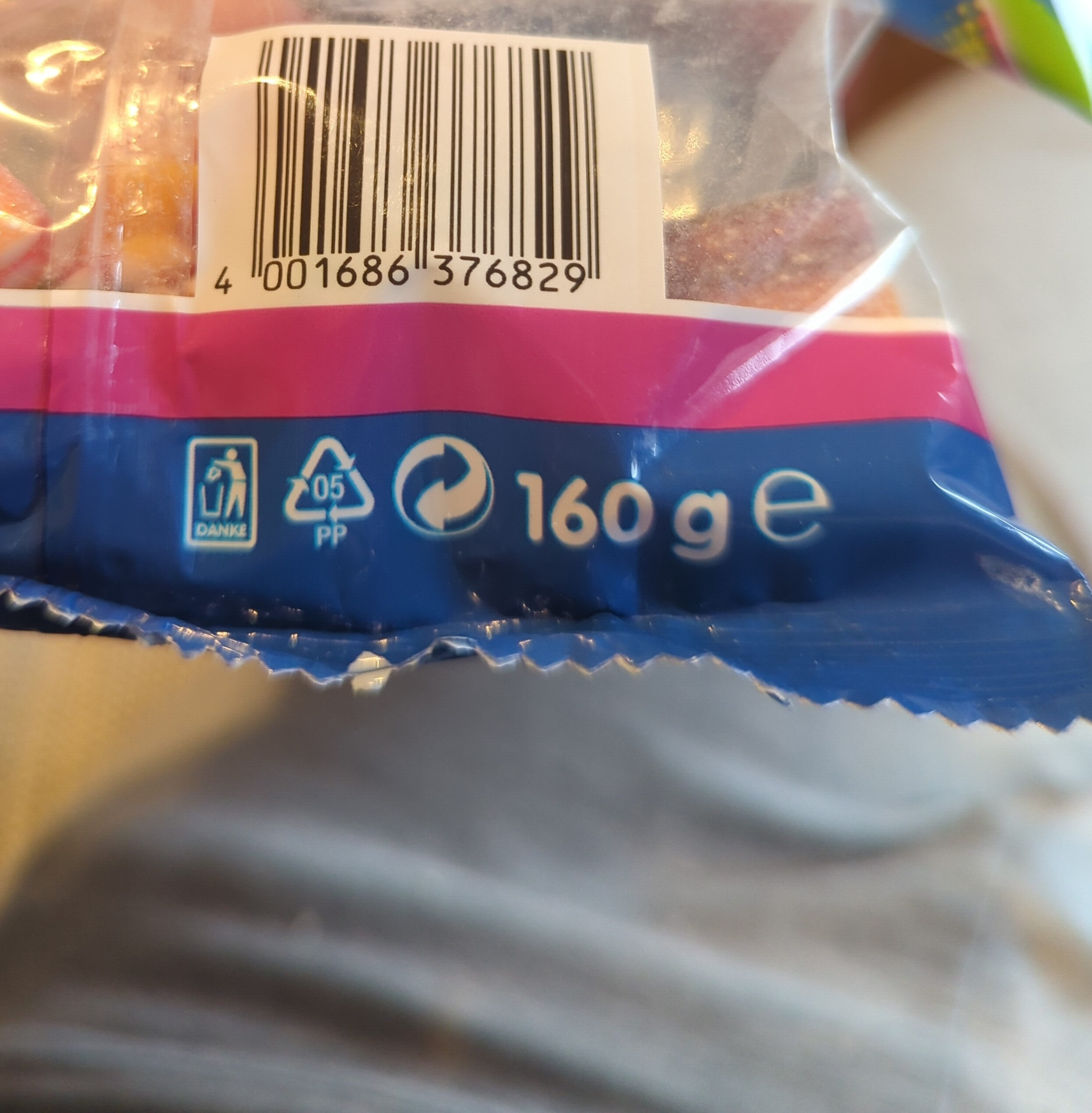Help us make food transparency the norm!
As a non-profit organization, we depend on your donations to continue informing consumers around the world about what they eat.
The food revolution starts with you!
Rainbow Pixel - Haribo - 160 g
Rainbow Pixel - Haribo - 160 g
This product page is not complete. You can help to complete it by editing it and adding more data from the photos we have, or by taking more photos using the app for Android or iPhone/iPad. Thank you!
×
Barcode: 4001686376829 (EAN / EAN-13)
Quantity: 160 g
Packaging: Plastic, Pp-polypropylene
Brands: Haribo
Categories: Snacks, Sweet snacks, Confectioneries, Candies, Gummi candies, Acid gummy candies
Labels, certifications, awards:
Vegetarian, Vegan, European Vegetarian Union, Made in the EU
Countries where sold: Germany
Matching with your preferences
Health
Ingredients
-
35 ingredients
: Zucker, Glukosesirup, Stärke, Feuchthaltemittel: Sorbitsirup, Weizenmehl, Säuerungsmittel: Citronensäure, Äpfelsäure, Emulgatoren: Mono - und Diglyceride von Speisefettsäuren, Citronensäureester von Mono - und Diglyceriden von Speisefettsäuren, Palmfett, Dextrose, Säureregulatoren: Natriummalat, Trinatriumcitrat, Mononatriumcitrat, Geliermittel: Carrageen, Aroma, Frucht - und Pflanzenkonzentrate: Karotte, Spirulina, Süßkartoffel, Schwarze Johannisbeere, Holunderbeere, Apfel, Hibiskus, Rettich, Aronia, Traube, Holunderbeerextrakt, Farbstoff: KurkuminAllergens: GlutenTraces: Milk
Food processing
-
Ultra processed foods
Elements that indicate the product is in the 4 - Ultra processed food and drink products group:
- Additive: E100 - Curcumin
- Additive: E407 - Carrageenan
- Additive: E420 - Sorbitol
- Additive: E471 - Mono- and diglycerides of fatty acids
- Additive: E472c - Citric acid esters of mono- and diglycerides of fatty acids
- Ingredient: Colour
- Ingredient: Dextrose
- Ingredient: Emulsifier
- Ingredient: Flavouring
- Ingredient: Gelling agent
- Ingredient: Glucose
- Ingredient: Glucose syrup
- Ingredient: Humectant
Food products are classified into 4 groups according to their degree of processing:
- Unprocessed or minimally processed foods
- Processed culinary ingredients
- Processed foods
- Ultra processed foods
The determination of the group is based on the category of the product and on the ingredients it contains.
Additives
-
E296 - Malic acid
Malic acid: Malic acid is an organic compound with the molecular formula C4H6O5. It is a dicarboxylic acid that is made by all living organisms, contributes to the pleasantly sour taste of fruits, and is used as a food additive. Malic acid has two stereoisomeric forms -L- and D-enantiomers-, though only the L-isomer exists naturally. The salts and esters of malic acid are known as malates. The malate anion is an intermediate in the citric acid cycle.Source: Wikipedia
-
E330 - Citric acid
Citric acid is a natural organic acid found in citrus fruits such as lemons, oranges, and limes.
It is widely used in the food industry as a flavor enhancer, acidulant, and preservative due to its tart and refreshing taste.
Citric acid is safe for consumption when used in moderation and is considered a generally recognized as safe (GRAS) food additive by regulatory agencies worldwide.
-
E331 - Sodium citrates
Sodium citrate: Sodium citrate may refer to any of the sodium salts of citrate -though most commonly the third-: Monosodium citrate Disodium citrate Trisodium citrateThe three forms of the salt are collectively known by the E number E331. Sodium citrates are used as acidity regulators in food and drinks, and also as emulsifiers for oils. They enable cheeses to melt without becoming greasy.Source: Wikipedia
-
E331i - Monosodium citrate
Sodium citrate: Sodium citrate may refer to any of the sodium salts of citrate -though most commonly the third-: Monosodium citrate Disodium citrate Trisodium citrateThe three forms of the salt are collectively known by the E number E331. Sodium citrates are used as acidity regulators in food and drinks, and also as emulsifiers for oils. They enable cheeses to melt without becoming greasy.Source: Wikipedia
-
E331iii - Trisodium citrate
Sodium citrate: Sodium citrate may refer to any of the sodium salts of citrate -though most commonly the third-: Monosodium citrate Disodium citrate Trisodium citrateThe three forms of the salt are collectively known by the E number E331. Sodium citrates are used as acidity regulators in food and drinks, and also as emulsifiers for oils. They enable cheeses to melt without becoming greasy.Source: Wikipedia
-
E350 - Sodium malates
Sodium malate: Sodium malate is a compound with formula Na2-C2H4O-COO-2-. It is the sodium salt of malic acid. As a food additive, it has the E number E350.Source: Wikipedia
-
E350i - Sodium malate
Sodium malate: Sodium malate is a compound with formula Na2-C2H4O-COO-2-. It is the sodium salt of malic acid. As a food additive, it has the E number E350.Source: Wikipedia
-
E407 - Carrageenan
Carrageenan (E407), derived from red seaweed, is widely employed in the food industry as a gelling, thickening, and stabilizing agent, notably in dairy and meat products.
It can exist in various forms, each imparting distinct textural properties to food.
However, its degraded form, often referred to as poligeenan, has raised health concerns due to its potential inflammatory effects and its classification as a possible human carcinogen (Group 2B) by the International Agency for Research on Cancer (IARC).
Nevertheless, food-grade carrageenan has been deemed safe by various regulatory bodies when consumed in amounts typically found in food.
-
E420 - Sorbitol
Sorbitol: Sorbitol --, less commonly known as glucitol --, is a sugar alcohol with a sweet taste which the human body metabolizes slowly. It can be obtained by reduction of glucose, which changes the aldehyde group to a hydroxyl group. Most sorbitol is made from corn syrup, but it is also found in nature, for example in apples, pears, peaches, and prunes. It is converted to fructose by sorbitol-6-phosphate 2-dehydrogenase. Sorbitol is an isomer of mannitol, another sugar alcohol; the two differ only in the orientation of the hydroxyl group on carbon 2. While similar, the two sugar alcohols have very different sources in nature, melting points, and uses.Source: Wikipedia
-
E420ii - Sorbitol syrup
Sorbitol: Sorbitol --, less commonly known as glucitol --, is a sugar alcohol with a sweet taste which the human body metabolizes slowly. It can be obtained by reduction of glucose, which changes the aldehyde group to a hydroxyl group. Most sorbitol is made from corn syrup, but it is also found in nature, for example in apples, pears, peaches, and prunes. It is converted to fructose by sorbitol-6-phosphate 2-dehydrogenase. Sorbitol is an isomer of mannitol, another sugar alcohol; the two differ only in the orientation of the hydroxyl group on carbon 2. While similar, the two sugar alcohols have very different sources in nature, melting points, and uses.Source: Wikipedia
-
E471 - Mono- and diglycerides of fatty acids
Mono- and diglycerides of fatty acids (E471), are food additives commonly used as emulsifiers in various processed foods.
These compounds consist of glycerol molecules linked to one or two fatty acid chains, which help stabilize and blend water and oil-based ingredients. E471 enhances the texture and shelf life of products like margarine, baked goods, and ice cream, ensuring a smooth and consistent texture.
It is generally considered safe for consumption within established regulatory limits.
Ingredients analysis
-
Palm oil
Ingredients that contain palm oil: Palm fat
-
Vegan
No non-vegan ingredients
-
Vegetarian
No non-vegetarian ingredients detected
-
Details of the analysis of the ingredients
: Zucker, Glukosesirup, Stärke, Feuchthaltemittel (Sorbitsirup), _Weizenmehl_, Säuerungsmittel (Citronensäure), Äpfelsäure, Emulgatoren (mono- und Diglyceride von Speisefettsäuren), Citronensäureester von mono- und Diglyceriden von Speisefettsäuren, Palmfett, Dextrose, Säureregulatoren (Natriummalat), Trinatriumcitrat, Mononatriumcitrat, Geliermittel (Carrageen), Aroma, Frucht-und Pflanzenkonzentrate (Karotte), Spirulina, Süßkartoffel, Schwarze Johannisbeere, Holunderbeere, Apfel, Hibiskus, Rettich, Aronia, Traube, Holunderbeerextrakt, Farbstoff (Kurkumin)- Zucker -> en:sugar - vegan: yes - vegetarian: yes - ciqual_proxy_food_code: 31016 - percent_min: 3.57142857142857 - percent_max: 100
- Glukosesirup -> en:glucose-syrup - vegan: yes - vegetarian: yes - ciqual_proxy_food_code: 31016 - percent_min: 0 - percent_max: 50
- Stärke -> en:starch - vegan: yes - vegetarian: yes - ciqual_proxy_food_code: 9510 - percent_min: 0 - percent_max: 33.3333333333333
- Feuchthaltemittel -> en:humectant - percent_min: 0 - percent_max: 25
- Sorbitsirup -> en:e420ii - vegan: yes - vegetarian: yes - percent_min: 0 - percent_max: 25
- _Weizenmehl_ -> en:wheat-flour - vegan: yes - vegetarian: yes - ciqual_proxy_food_code: 9410 - percent_min: 0 - percent_max: 20
- Säuerungsmittel -> en:acid - percent_min: 0 - percent_max: 16.6666666666667
- Citronensäure -> en:e330 - vegan: yes - vegetarian: yes - percent_min: 0 - percent_max: 16.6666666666667
- Äpfelsäure -> en:e296 - vegan: yes - vegetarian: yes - percent_min: 0 - percent_max: 14.2857142857143
- Emulgatoren -> en:emulsifier - percent_min: 0 - percent_max: 12.5
- mono- und Diglyceride von Speisefettsäuren -> en:e471 - vegan: maybe - vegetarian: maybe - from_palm_oil: maybe - percent_min: 0 - percent_max: 12.5
- Citronensäureester von mono- und Diglyceriden von Speisefettsäuren -> en:e472c - vegan: maybe - vegetarian: maybe - from_palm_oil: maybe - percent_min: 0 - percent_max: 11.1111111111111
- Palmfett -> en:palm-fat - vegan: yes - vegetarian: yes - from_palm_oil: yes - ciqual_proxy_food_code: 16129 - percent_min: 0 - percent_max: 10
- Dextrose -> en:dextrose - vegan: yes - vegetarian: yes - ciqual_proxy_food_code: 31016 - percent_min: 0 - percent_max: 9.09090909090909
- Säureregulatoren -> en:acidity-regulator - percent_min: 0 - percent_max: 8.33333333333333
- Natriummalat -> en:e350i - vegan: yes - vegetarian: yes - percent_min: 0 - percent_max: 8.33333333333333
- Trinatriumcitrat -> en:e331iii - vegan: yes - vegetarian: yes - percent_min: 0 - percent_max: 7.69230769230769
- Mononatriumcitrat -> en:e331i - vegan: yes - vegetarian: yes - percent_min: 0 - percent_max: 7.14285714285714
- Geliermittel -> en:gelling-agent - percent_min: 0 - percent_max: 6.66666666666667
- Carrageen -> en:e407 - vegan: yes - vegetarian: yes - percent_min: 0 - percent_max: 6.66666666666667
- Aroma -> en:flavouring - vegan: maybe - vegetarian: maybe - percent_min: 0 - percent_max: 5
- Frucht-und Pflanzenkonzentrate -> en:fruit-and-plant-concentrates - vegan: yes - vegetarian: yes - percent_min: 0 - percent_max: 5
- Karotte -> en:carrot - vegan: yes - vegetarian: yes - ciqual_food_code: 20009 - percent_min: 0 - percent_max: 5
- Spirulina -> en:spirulina - vegan: yes - vegetarian: yes - ciqual_proxy_food_code: 20984 - percent_min: 0 - percent_max: 5
- Süßkartoffel -> en:sweet-potato - vegan: yes - vegetarian: yes - ciqual_food_code: 4101 - percent_min: 0 - percent_max: 5
- Schwarze Johannisbeere -> en:blackcurrant - vegan: yes - vegetarian: yes - ciqual_food_code: 13007 - percent_min: 0 - percent_max: 5
- Holunderbeere -> en:elderberry - vegan: yes - vegetarian: yes - ciqual_food_code: 13126 - percent_min: 0 - percent_max: 4.76190476190476
- Apfel -> en:apple - vegan: yes - vegetarian: yes - ciqual_food_code: 13050 - percent_min: 0 - percent_max: 4.54545454545455
- Hibiskus -> en:roselle-flower - vegan: yes - vegetarian: yes - percent_min: 0 - percent_max: 4.34782608695652
- Rettich -> en:radish - vegan: yes - vegetarian: yes - ciqual_food_code: 20045 - percent_min: 0 - percent_max: 4.16666666666667
- Aronia -> en:chokeberry - vegan: yes - vegetarian: yes - percent_min: 0 - percent_max: 4
- Traube -> en:grape - vegan: yes - vegetarian: yes - ciqual_food_code: 13112 - percent_min: 0 - percent_max: 3.84615384615385
- Holunderbeerextrakt -> en:elderberry-extract - vegan: yes - vegetarian: yes - ciqual_food_code: 13126 - percent_min: 0 - percent_max: 3.7037037037037
- Farbstoff -> en:colour - percent_min: 0 - percent_max: 3.57142857142857
- Kurkumin -> en:e100 - vegan: yes - vegetarian: yes - percent_min: 0 - percent_max: 3.57142857142857
Nutrition
-
Poor nutritional quality
⚠ ️Warning: the amount of fiber is not specified, their possible positive contribution to the grade could not be taken into account.⚠ ️Warning: the amount of fruits, vegetables and nuts is not specified on the label, it was estimated from the list of ingredients: 0This product is not considered a beverage for the calculation of the Nutri-Score.
Positive points: 0
- Proteins: 0 / 5 (value: 0.8, rounded value: 0.8)
- Fiber: 0 / 5 (value: 0, rounded value: 0)
- Fruits, vegetables, nuts, and colza/walnut/olive oils: 0 / 5 (value: 0.0012752466968351, rounded value: 0)
Negative points: 15
- Energy: 4 / 10 (value: 1561, rounded value: 1561)
- Sugars: 10 / 10 (value: 59, rounded value: 59)
- Saturated fat: 1 / 10 (value: 2, rounded value: 2)
- Sodium: 0 / 10 (value: 88, rounded value: 88)
The points for proteins are not counted because the negative points are greater or equal to 11.
Nutritional score: (15 - 0)
Nutri-Score:
-
Nutrient levels
-
Fat in low quantity (2.7%)
What you need to know- A high consumption of fat, especially saturated fats, can raise cholesterol, which increases the risk of heart diseases.
Recommendation: Limit the consumption of fat and saturated fat- Choose products with lower fat and saturated fat content.
-
Saturated fat in moderate quantity (2%)
What you need to know- A high consumption of fat, especially saturated fats, can raise cholesterol, which increases the risk of heart diseases.
Recommendation: Limit the consumption of fat and saturated fat- Choose products with lower fat and saturated fat content.
-
Sugars in high quantity (59%)
What you need to know- A high consumption of sugar can cause weight gain and tooth decay. It also augments the risk of type 2 diabetes and cardio-vascular diseases.
Recommendation: Limit the consumption of sugar and sugary drinks- Sugary drinks (such as sodas, fruit beverages, and fruit juices and nectars) should be limited as much as possible (no more than 1 glass a day).
- Choose products with lower sugar content and reduce the consumption of products with added sugars.
-
Salt in low quantity (0.22%)
What you need to know- A high consumption of salt (or sodium) can cause raised blood pressure, which can increase the risk of heart disease and stroke.
- Many people who have high blood pressure do not know it, as there are often no symptoms.
- Most people consume too much salt (on average 9 to 12 grams per day), around twice the recommended maximum level of intake.
Recommendation: Limit the consumption of salt and salted food- Reduce the quantity of salt used when cooking, and don't salt again at the table.
- Limit the consumption of salty snacks and choose products with lower salt content.
-
-
Nutrition facts
Nutrition facts As sold
for 100 g / 100 mlCompared to: Acid gummy candies Energy 1,561 kj
(373 kcal)+8% Fat 2.7 g +501% Saturated fat 2 g +758% Carbohydrates 86 g +7% Sugars 59 g +1% Fiber ? Proteins 0.8 g -75% Salt 0.22 g +16% Fruits‚ vegetables‚ nuts and rapeseed‚ walnut and olive oils (estimate from ingredients list analysis) 0.001 %
Environment
-
Eco-Score C - Moderate environmental impact
⚠ ️Select a country in order to include the full impact of transportation.The Eco-Score is an experimental score that summarizes the environmental impacts of food products.→ The Eco-Score was initially developped for France and it is being extended to other European countries. The Eco-Score formula is subject to change as it is regularly improved to make it more precise and better suited to each country.Life cycle analysis
-
Average impact of products of the same category: A (Score: 89/100)
Category: Jelly candy
Category: Jelly candy
- PEF environmental score: 0.21 (the lower the score, the lower the impact)
- including impact on climate change: 1.57 kg CO2 eq/kg of product
Stage Impact Agriculture
51.7 %Processing
31.1 %Packaging
7.6 %Transportation
7.3 %Distribution
2.3 %Consumption
0.0 %
Bonuses and maluses
-
Missing origins of ingredients information
Malus: -5
⚠ ️ The origins of the ingredients of this product are not indicated.
If they are indicated on the packaging, you can modify the product sheet and add them.
If you are the manufacturer of this product, you can send us the information with our free platform for producers.
-
Ingredients that threatens species
Malus: -10
Contains palm oil
Tropical forests in Asia, Africa and Latin America are destroyed to create and expand oil palm tree plantations. The deforestation contributes to climate change, and it endangers species such as the orangutan, the pigmy elephant and the Sumatran rhino.
-
Missing packaging information for this product
Malus: -15
⚠ ️ The information about the packaging of this product is not filled in.⚠ ️ For a more precise calculation of the Eco-Score, you can modify the product page and add them.
If you are the manufacturer of this product, you can send us the information with our free platform for producers.
Eco-Score for this product
-
Impact for this product: C (Score: 59/100)
Product: Rainbow Pixel - Haribo - 160 g
Life cycle analysis score: 89
Sum of bonuses and maluses: -30
Final score: 59/100
-
Carbon footprint
-
Equal to driving 0.8 km in a petrol car
157 g CO² per 100g of product
The carbon emission figure comes from ADEME's Agribalyse database, for the category: Jelly candy (Source: ADEME Agribalyse Database)
Stage Impact Agriculture
36.9 %Processing
38.1 %Packaging
11.9 %Transportation
12.0 %Distribution
1.1 %Consumption
0.0 %
Packaging
-
Missing packaging information for this product
⚠ ️ The information about the packaging of this product is not filled in.Take a photo of the recycling information Take a photo of the recycling information
Transportation
-
Origins of ingredients
Missing origins of ingredients information
⚠ ️ The origins of the ingredients of this product are not indicated.
If they are indicated on the packaging, you can modify the product sheet and add them.
If you are the manufacturer of this product, you can send us the information with our free platform for producers.Add the origins of ingredients for this product Add the origins of ingredients for this product
Threatened species
-
Contains palm oil
Drives deforestation and threatens species such as the orangutan
Tropical forests in Asia, Africa and Latin America are destroyed to create and expand oil palm tree plantations. The deforestation contributes to climate change, and it endangers species such as the orangutan, the pigmy elephant and the Sumatran rhino.
Report a problem
-
Incomplete or incorrect information?
Category, labels, ingredients, allergens, nutritional information, photos etc.
If the information does not match the information on the packaging, please complete or correct it. Open Food Facts is a collaborative database, and every contribution is useful for all.
Data sources
Product added on by kiliweb
Last edit of product page on by roboto-app.
Product page also edited by ayecptn, itsjustruby, openfoodfacts-contributors, silar, spotter, yuka.sY2b0xO6T85zoF3NwEKvlk8dfYH4ixPjbxPkmRynyPqtMsz1Qe1Qxrr3Mqg.













